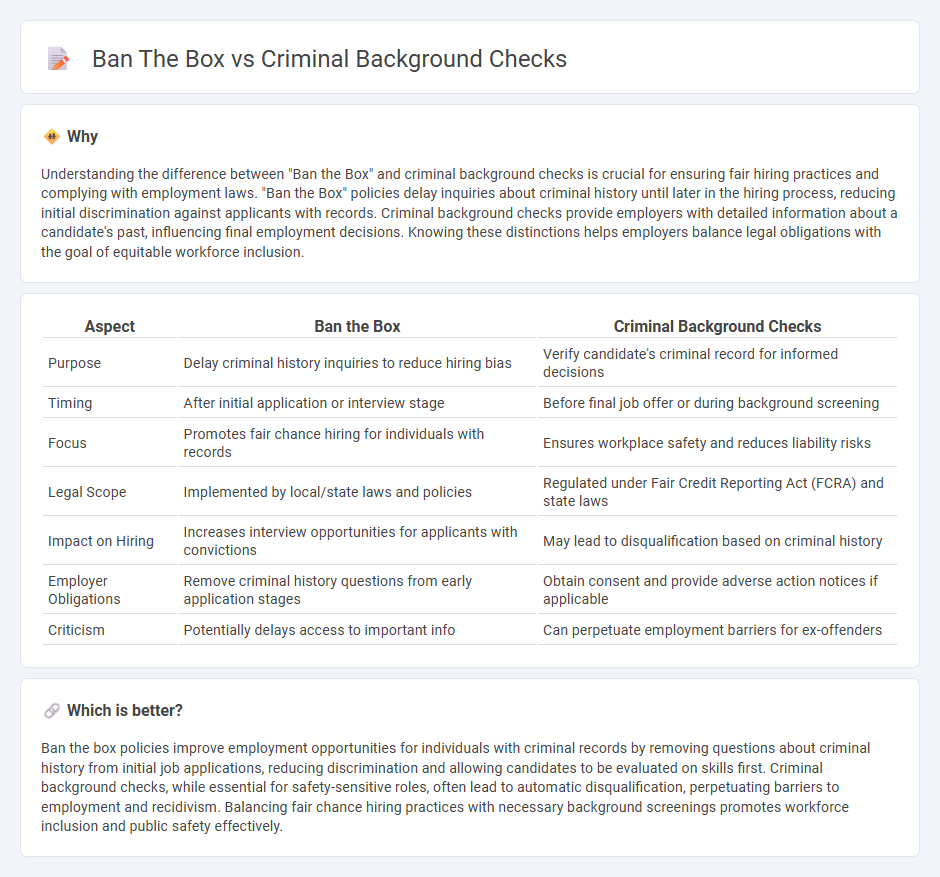
Ban the Box policies remove the checkbox asking about criminal history from job applications, aiming to reduce employment barriers for individuals with past convictions. Criminal background checks, however, remain a common practice for employers seeking to assess candidate risk and ensure workplace safety. Explore the impacts and debates surrounding these approaches to employment screening.
Why it is important
Understanding the difference between "Ban the Box" and criminal background checks is crucial for ensuring fair hiring practices and complying with employment laws. "Ban the Box" policies delay inquiries about criminal history until later in the hiring process, reducing initial discrimination against applicants with records. Criminal background checks provide employers with detailed information about a candidate's past, influencing final employment decisions. Knowing these distinctions helps employers balance legal obligations with the goal of equitable workforce inclusion.
Comparison Table
| Aspect | Ban the Box | Criminal Background Checks |
|---|---|---|
| Purpose | Delay criminal history inquiries to reduce hiring bias | Verify candidate's criminal record for informed decisions |
| Timing | After initial application or interview stage | Before final job offer or during background screening |
| Focus | Promotes fair chance hiring for individuals with records | Ensures workplace safety and reduces liability risks |
| Legal Scope | Implemented by local/state laws and policies | Regulated under Fair Credit Reporting Act (FCRA) and state laws |
| Impact on Hiring | Increases interview opportunities for applicants with convictions | May lead to disqualification based on criminal history |
| Employer Obligations | Remove criminal history questions from early application stages | Obtain consent and provide adverse action notices if applicable |
| Criticism | Potentially delays access to important info | Can perpetuate employment barriers for ex-offenders |
Which is better?
Ban the box policies improve employment opportunities for individuals with criminal records by removing questions about criminal history from initial job applications, reducing discrimination and allowing candidates to be evaluated on skills first. Criminal background checks, while essential for safety-sensitive roles, often lead to automatic disqualification, perpetuating barriers to employment and recidivism. Balancing fair chance hiring practices with necessary background screenings promotes workforce inclusion and public safety effectively.
Connection
Ban the box policies limit employers from inquiring about criminal history on initial job applications, promoting fair hiring opportunities for individuals with prior convictions. Criminal background checks are typically conducted later in the hiring process, allowing employers to assess candidates without immediate bias. Together, these measures aim to balance public safety concerns with reducing barriers to employment for people with criminal records.
Key Terms
Fair Chance Hiring
Criminal background checks often create barriers for job seekers with past convictions, limiting their employment opportunities even if they are qualified. Ban the Box policies delay inquiries about criminal history until later in the hiring process, promoting fair chance hiring by reducing upfront discrimination and encouraging employers to assess candidates based on skills first. Explore effective strategies and legal frameworks to implement Fair Chance Hiring and support equitable employment practices.
Recidivism
Criminal background checks often limit employment opportunities for individuals with prior convictions, which can increase recidivism rates by hindering reintegration into society. Ban the Box policies delay inquiry into criminal history, promoting fairer hiring practices and reducing barriers to employment that contribute to lower recidivism. Explore how these approaches impact recidivism and workforce inclusion in greater detail.
Equal Employment Opportunity
Criminal background checks help employers assess the risk of hiring candidates with a criminal history, but they can inadvertently contribute to discrimination against marginalized groups, conflicting with principles of Equal Employment Opportunity (EEO). Ban the Box policies delay criminal history inquiries until later in the hiring process, promoting fair chance employment and reducing barriers for qualified applicants with past convictions. Explore how integrating compliant background screening with Ban the Box initiatives fosters inclusive hiring practices.
Source and External Links
Criminal Background Checks For Employment - This webpage provides information on how criminal background checks can show felony and misdemeanor convictions, infractions, and pending cases for employment purposes.
Background checks | Minnesota Department of Public Safety - This resource explains the different types of background checks conducted by the Minnesota Bureau of Criminal Apprehension for various entities, including employers and law enforcement.
Criminal Record Checks - This webpage discusses the process for obtaining a criminal record check, often required for international purposes such as adoption or employment, and provides information on FBI records checks.
 dowidth.com
dowidth.com